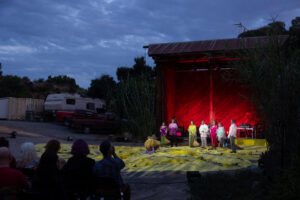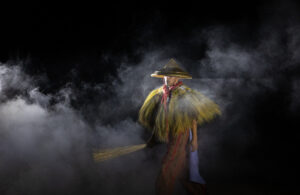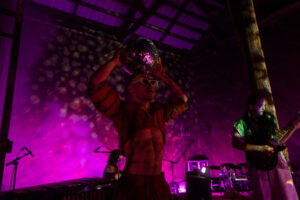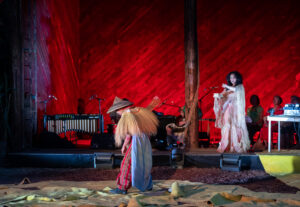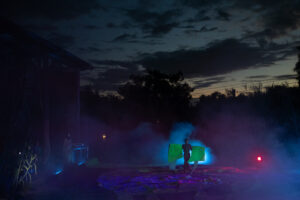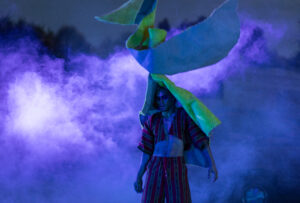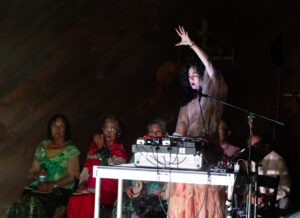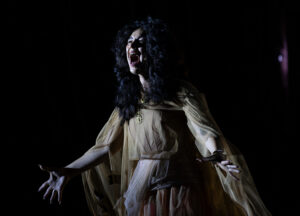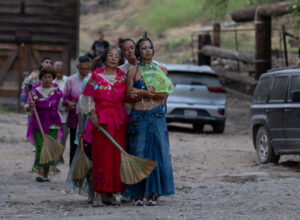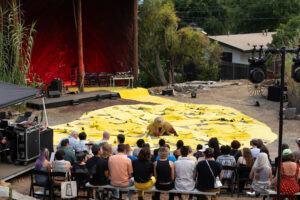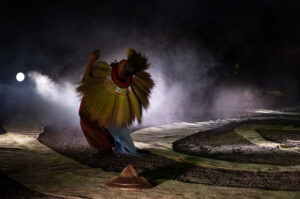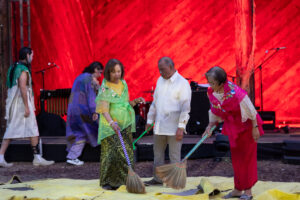APOLAKI: OPERA OF THE SCORCHED EARTH
By Micaela Tobin with Jay Carlon
Friday and Saturday, July 21–22, 2023 | 7:30 PM
Programming: APOLAKI: Film Screening and Q&A
Zorthian Ranch (Lower)
3990 N Fair Oaks Ave
Altadena, CA 91001
Download the Digital Program and Libretto
A displaced God walks a foreign and unfamiliar land, looking for liberation beyond the Empire of the Sun. But what is beyond the horizon, and who has walked this path before?
APOLAKI: OPERA OF THE SCORCHED EARTH is a new experimental opera by Filipino-American composer Micaela Tobin in collaboration with installation designer Carlo Maghirang and dancer/choreographer Jay Carlon. Continuing her celebration of the pre-colonial mythologies of the Philippines, Tobin’s new work tells the story of Apolaki, the precolonial God of Sun and War, who finds themself lost in a foreign and unfamiliar land (present day Tongva Land/Los Angeles) after being displaced from the Philippines by Spanish colonizers. This opera is a radical meditation on the complex relationships between settler colonialism, migration, and diaspora, and invites the audience to join Apolaki in this immersive pilgrimage, premiering at the historic and storied Zorthian Ranch overlooking the Los Angeles Basin.
This piece is the sequel to Tobin’s recent opera-film, “BAKUNAWA: Opera of the Seven Moons” which premiered at REDCAT in May 2021. Incorporating her signature combination of noise, drone, and opera, for this premiere Tobin has recruited experimental percussionist M.A. Harms and electric bass/guitarist Stephen McNeely to create a dramatic and disruptive soundscape that will draw Apolaki and the audience into a portal for Filipinx Liberation in the form of a large walking-labyrinth, designed by Carlo Maghirang.
APOLAKI is a National Performance Network (NPN) Creation & Development Fund Project co-commissioned by Los Angeles Contemporary Exhibitions in partnership with OUTsider Festival, and NPN. The Creation & Development Fund is supported by the Doris Duke Charitable Foundation, the Mellon Foundation, and the National Endowment for the Arts (a federal agency). For more information, visit www.npnweb.org. Additional support is provided by the Andy Warhol Foundation for the Visual Arts and the MAP Fund, supported by the Doris Duke Charitable Foundation and the Andrew W. Mellon Foundation.
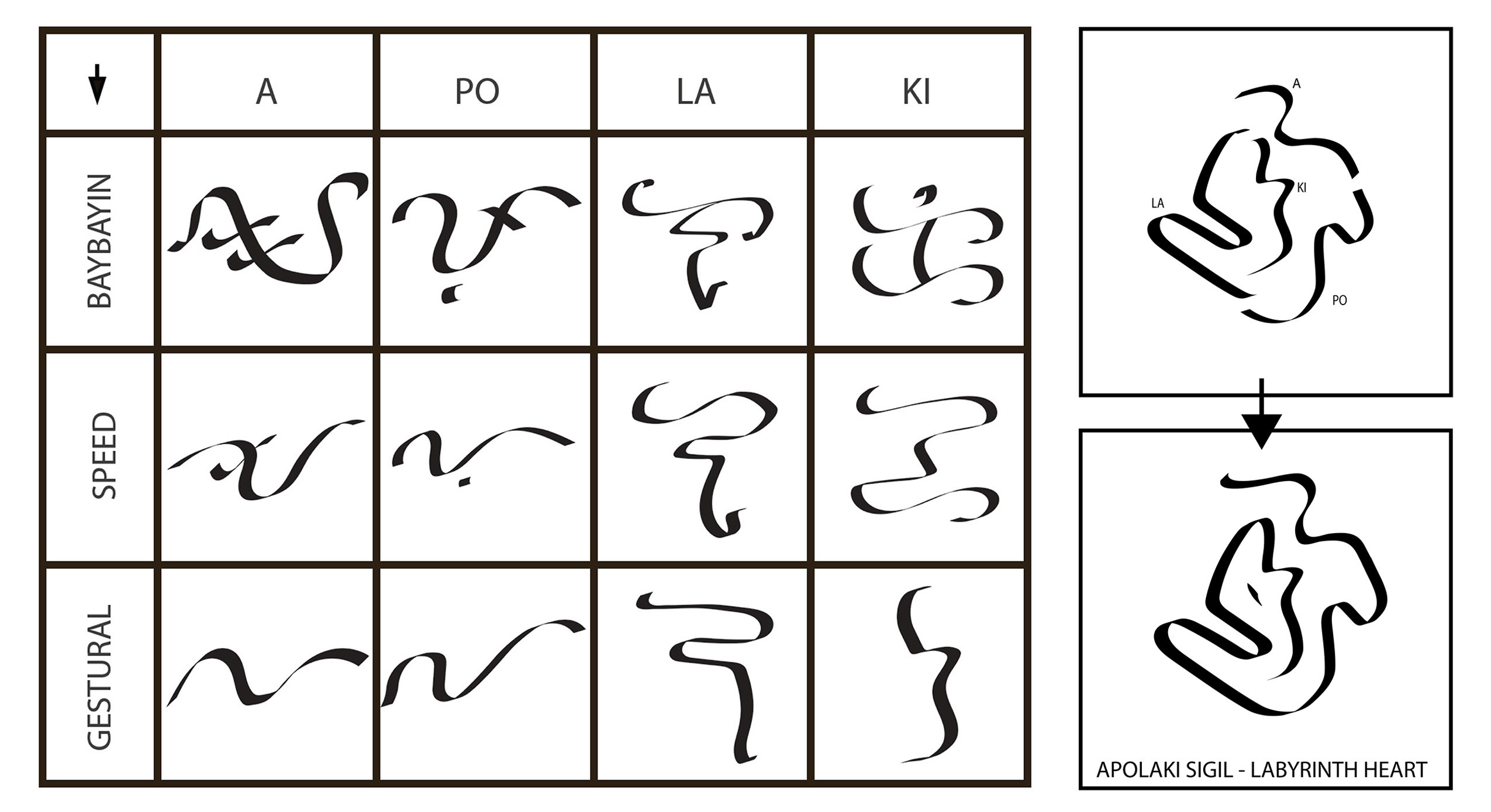 Diagram of APOLAKI sigil by Carlo Maghirang.
Diagram of APOLAKI sigil by Carlo Maghirang.
Director’s Note
“To the Illocano…the sky is no other than the blue and concave dome that covers us…It is a circular plane where mountains support the sky which they believe to be much bigger than its actual size. As such, it is unreachable and if it could be reached, it would take a whole lifetime of running nonstop towards the horizon.” — Isabelo de los Reyes, El Folklore Filipino
“Our interlocking histories are in constant (dis)harmony, but there is also an intimate and beautiful poetry in these stories that I am seeking to sound out. How each of us came to be here is complicated, noisy, and nuanced. For instance, the land we gather on tonight is the unceded ancestral lands of the Gabrielino-Tongva People that was violently stolen by settler colonialists, and eventually ended up in the hands of a gentle artist named Jirayr Zorthian—a refugee who was forced from his own ancestral lands by genocide. Jirayr went on to turn this place into a refuge for artists, philosophers, and dreamers from all walks of life, and today the land is taken care of by his living descendents and a large community of people dedicated to tending and transforming this place.
Jay’s, Carlo’s, and my ancestors first landed on the California Coast in 1587 against their will—forced aboard the Manila Galleon by Spanish colonizers, and forced to make first contact with the Northern Chumash Tribe in Morro Bay. Their brown bodies were pitted against other brown bodies as tools of colonization. Four-hundred years later and a mere 120 miles from that very spot, Manong Larry Itliong began the Delano labor strike, uniting Mexican and Filipino farm workers (including Jay’s own father—a Manong who worked in the strawberry fields!) against the oppressive and racist policies of the white farm owners, changing, and in many ways, healing, the course of our history.
As for me, I grew up in these foothills, a few miles east of Zorthian Ranch. As a child, I would hike these mountains with my father, where he taught me the art of walking these trails in a quiet, graceful reverence to the natural environment. I soon came to learn that these mountains speak, if you listen, and ever since, these mountains have been a safe place for me to escape the noise of Los Angeles. So tonight, I am deeply honored to finally be able to reverberate back into them, sounding out the noisy (dis)harmony of our collective diaspora. Tonight, we will walk with Apolaki over the horizon and into the dark abyss. Tonight, our liberation will become a joyful dance.
In the labyrinth, there is one winding path that leads towards the center—follow it there, and you shall be transformed.” — Micaela Tobin
Notes from Collaborators
“When Micaela asked me to be Apolaki in her new opera, I questioned whether I can live up to the strength and resilience of the Filipinx god of sun and war. I imagined the fire inside of me — the energy that fuels and sustains me, as well as the fire that fills me with rage, a necessary fury to hold onto our dignity. ‘
‘The Healer and the Warrior are but two sides of the same coin.’ — Philippine Proverb
The Philippine people have fought for hundreds of years over their land and agency over their bodies, so much that it has become normalized for us to accept the confines of white supremacy. I ponder, what happens if we stop fighting? I imagine the sun displaced and reemerged as a disco ball in a dark warehouse space for queer folks and people pushed to the fringes of society to seek refuge. And amidst the glittery, solar flares of that disco ball sprayed upon our beautiful brown bodies, liberation thrives. A space for the body to express itself, fully. A space to commune with unbridled joy. This is the future for Filipinx people. Apolaki lives in me.” — Jay Carlon
“Our reimagined Apolaki travels the world from his ancestral home to escape the reaches of the Sun in hopes of escaping the grips of colonization. He marks his landing with a symbol: a sigil of his own name. Once on the ground, a path emerges. Apolaki’s Labyrinth is born, and with it a path back home.
Four characters in the precolonial script of Baybayin spell Apolaki’s name. These characters are then diluted through short-hand gestures from their truest meaning and creates an architectural form that tells the story of Apolaki’s own displacement: an identity that has been lost through transit, time, and translation.” — Carlo Maghirang, Apolaki Installation Designer
Photos by Angel Origgi.
About the Artists
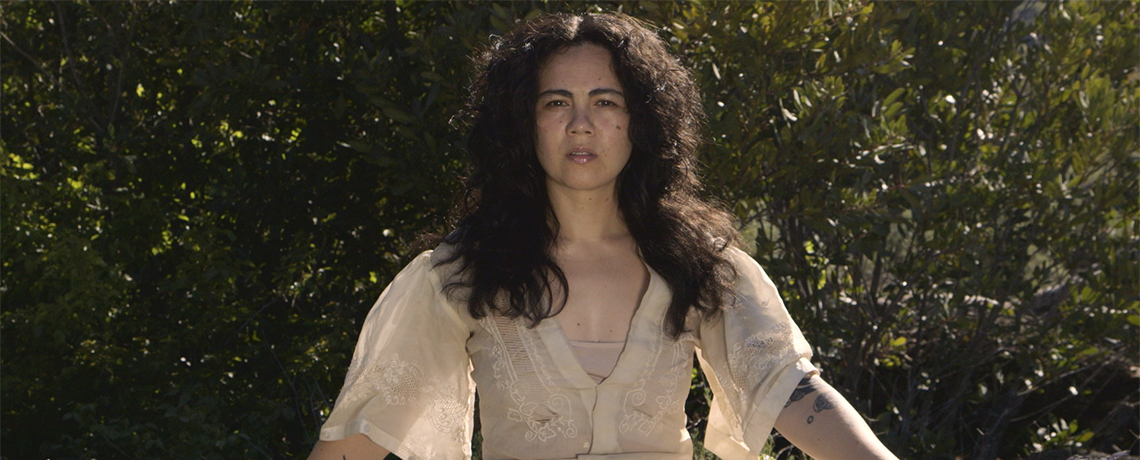
Micaela Tobin is a soprano, sound artist, and teacher based in Los Angeles, CA who specializes in experimental voice and contemporary opera.
As a sound artist with a background in opera, Micaela integrates voice and electronics within the genres of noise and drone music. Her work incorporates ritualized gesture and amplified object-symbolism and explores her diasporic identity as a first-generation Filipina-American. Micaela’s vocal practice is based in building connections between the physical voice as a means of empowering one’s ‘inner’ voice and challenging colonial stories and systems.
Composing primarily under the moniker “White Boy Scream,” Micaela dissects her operatic and extended vocal techniques through the use of electronics, oscillating between extreme textures of noise, drone, and operatic sound walls. Her most recent full length album, “BAKUNAWA” (Deathbomb Arc) includes elements of sonic ritual, ancient myth, and ancestral memory. Of the album, Steve Smith of The New Yorker Magazine asserts that “opera would do well to pay attention.” The album was ranked #9 Release of 2020 in The Wire Magazine. In May 2021, Micaela premiered the cinematic adaptation of the album through REDCAT, titled “BAKUNAWA: Opera of the Seven Moons.”
As an opera composer, Micaela premiered and earned a five-star review for her first original experimental opera, entitled “Unseal Unseam,” at the world’s largest art festival, the Edinburgh Festival Fringe, in summer 2016; the work was described as “hypnotic” and “paralyzingly beautiful,” by New Classic LA after its U.S. debut in October 2017. Her most recent opera, “Belarion: A Space Opera” which premiered at the American Legion Center in Pasadena, CA in February 2019, is about the magickal practices of JPL founder Jack Parsons.
As a performer, Micaela played the principal role of Coyote in the critically acclaimed opera, SWEET LAND (dir. Yuval Sharon & Canuppa Luger; Comp. Raven Chacon & Du Yun). She also performed with The Industry in their groundbreaking opera, “Hopscotch, a mobile opera for 24 cars (dir. Yuval Sharon).” She has also toured with hip-hop experimentalists clipping. on their 2017 tour with The Flaming Lips. Micaela also appeared as a principal vocalist in the premiere of Ron Athey and Sean Griffith’s automatic opera, “Gifts the Spirit”; and as a soprano soloist alongside Annette Bening in the play “Medea” at UCLALive.
Micaela is currently a voice teacher on faculty at the California Institute for the Arts and teaches through her private studio, HOWL SPACE, in Los Angeles, CA.
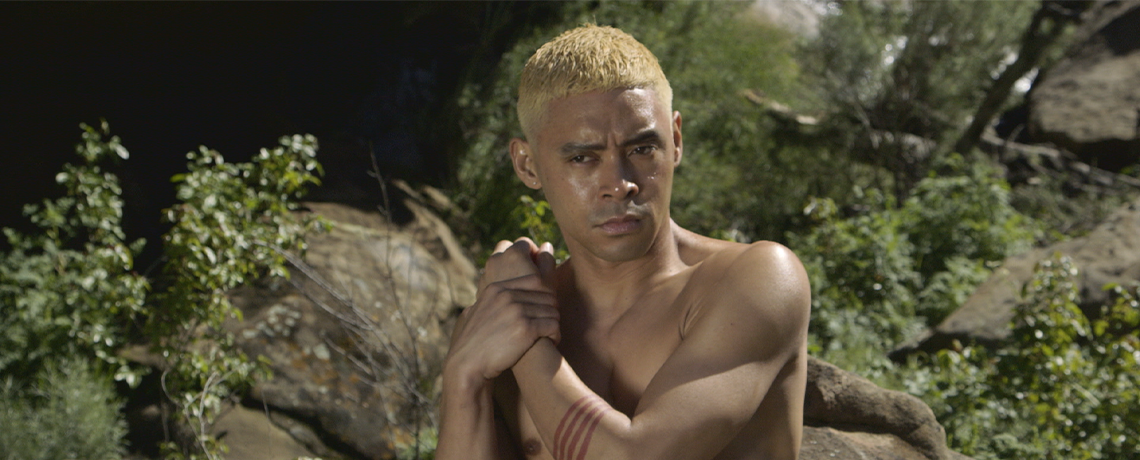
Jay Carlon was born and raised on California’s Central Coast, Carlon’s work is inspired by growing up the youngest of 12 in a Filipino, Catholic, and agricultural migrant-working family. He is committed to connecting his art practice to sustainability and his personal and collective journey of decolonization.
Jay’s work has been presented in Los Angeles at REDCAT NOW Festival, The Broad Museum, Los Angeles Dance Project, Annenberg Community Beach House, LA Dance Festival, Electric Lodge, Los Angeles Performance Practice D+R Residencies, homeLA, and Beach Dances; in New York at 92ndY and The CURRENT SESSIONS; in Phoenix at Breaking Ground Festival; in Monterrey, Mexico at Espacio Expectante; and in Bangkok, Thailand at Creative Migration. Jay is a performer and directing associate with aerial spectacle theatre company Australia’s Sway Pole, where he has performed at the 2014 Olympics, the 2016 World EXPO, and the 2018 Super Bowl.
Carlon has also performed with the Metropolitan Opera at Lincoln Center, Palissimo, Oguri, No)one. Art House, and danced for Rodrigo y Gabriela on Jimmy Kimmel Live (choreographed by Annie-B Parson), in Solange Knowles’ art film Metronia (2018) choreographed by Gerard & Kelly, and was appointed Choreographic Associate for Kanye West’s opera, Mary (2019).
Satellite programming for APOLAKI: OPERA OF THE SCORCHED EARTH
November 30, 2022 | “Sounding the Ancestral Voice in Experimental Opera with Micaela Tobin” at the Philosophical Research Society
December 10, 2022 | “They Can’t Erase Me,” performance at First Church Congregation of Los Angeles presented by the Resonance Collective
May 20, 2023 | “Heal Hear Here,” music preview from “APOLAKI: Opera of the Scorched Earth”
PRESS
“Opera singers are, by definition, conservators of a cultural practice rooted in history and tradition. But Micaela Tobin—a Los Angeles-based vocalist and composer whose résumé extends from the maverick opera troupe the Industry to the experimental hip-hop group Clipping—uses her classically trained voice to slash through the hissing static, clangorous percussion, and punishing noise that she employs in White Boy Scream. Her latest album, “BAKUNAWA,” is also a gesture of preservation: she invokes the pre-colonial mythology of her Philippine ancestry in songs that pivot between sublimity, contemplation, and terror. “They can’t erase me,” Tobin chants in the epic title track and again in the closing “Apolaki,” proclaiming the power of myth even as she demands to be seen and heard for who she is. Opera would do well to pay attention.” —Steve Smith, The New Yorker
“…Bakunawa is a dense web of mish-mashed traditions; it’s a reclamation of a western classical practice, an interleaving of Filipino mythology, a post-industrial blast of noise, and a heartfelt burst of energy from an artist continuing to explore and unschackle her abilities.” —Spools Out, The Quietus; Tristan Bath; June 2020
“…she wields her voice and her instruments as both tools and weapons…” —Joshua Minsoo Kim; The Wire Magazine
